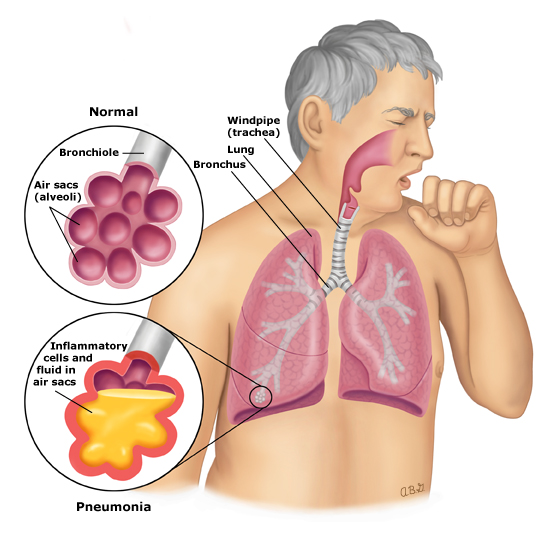|
جوین، نقاب، خیابان امام خمینی، نبش شهید آوینی، دانشکده پرستاری جوین تلفن بخش امانت: 45223811 (051) ایمیل: joveinlib[at]medsab.ac.ir |
|
| آمار بازديد این صفحه: |
7551 |
| تاریخ آخرین بروزرسانی: |
| پنج شنبه ١٣ دی ١٤٠٣ |
 چاپ
چاپ ![]() ارسال به دوست
ارسال به دوست

Patient education: 2019 novel coronavirus (The Basics)
What is 2019 novel coronavirus? What are the symptoms of 2019-nCoV? Should I see a doctor or nurse? Will I need tests? How is 2019-nCoV treated? Can 2019-nCoV be prevented?
What is 2019 novel coronavirus?2019 novel coronavirus, also called "2019-nCoV," is a virus that first appeared in late 2019 in the city of Wuhan, China. Infection with the virus can cause fever, cough, and trouble breathing. Problems with breathing happen when the infection affects the lungs and causes pneumonia (figure 1). Most cases of 2019-nCoV are in China. But there have been cases in other places, too, including in the United States. Most of these happened when people got the infection in China and then traveled to other countries. Some people probably got the infection from animals that had the virus. Many other people got it from contact with other people who had the virus. Experts are studying this new virus and will continue to learn more about it over time. What are the symptoms of 2019-nCoV?The symptoms can include: ●Fever higher than 100.4ºF (38ºC) ●Cough ●Trouble breathing ●Feeling tired ●Muscle aches Some people have no symptoms, or only mild symptoms. But in other people, 2019-nCoV can lead to serious problems like pneumonia, not getting enough oxygen, or even death. This is more common in people who have other health problems. Should I see a doctor or nurse?If you have a fever with cough or trouble breathing and might have been exposed to 2019-nCoV, see your doctor or nurse. You might have been exposed if you lived in or visited Wuhan, China in the 14 days before you got sick, or if you have been around a person who has the virus. If you have a face mask, put it on before you arrive at the clinic or hospital. If you do not have a face mask, call ahead to make sure they will be ready for you. That way the staff can keep you from spreading the virus to other people. If you are severely ill, go to the clinic or hospital right away. If you have not called ahead, let the staff know as soon as you arrive that you might have 2019-nCoV. The staff will ask you to wear a mask or to wait somewhere away from other people. Your doctor or nurse will do an exam and ask about your symptoms. They will also ask questions about where you live, and whether you have had contact with people who might be sick or with animals. Will I need tests?Yes. If your doctor or nurse suspects you have 2019-nCoV, they will do tests on samples of fluid taken from deep inside your nose, mouth, and lungs. They will also do blood tests. These tests can all show if you have 2019-nCoV or another infection. Your doctor might also order a chest X-ray to check your lungs. How is 2019-nCoV treated?Many people with 2019-nCoV have only mild illness and can stay at home until they get better. If you have more severe illness, you might need to be treated in the hospital, possibly in the intensive care unit (also called the "ICU"). There is no specific treatment for the infection, but the doctors and nurses in the hospital can monitor and support your breathing and other body functions, and make you as comfortable as possible. You might need extra oxygen to help you breathe easily. If you are having a very hard time breathing, you might need to be put on a ventilator. This is a machine to help you breathe. Can 2019-nCoV be prevented?There are things you can do to reduce your chances of getting 2019-nCoV. Some experts recommend avoiding travel to China if it is not necessary. If you do live or travel there, you can lower your risk of infection by avoiding animals and markets that sell animal products. Do not eat raw meat, and do not eat food that might have been in contact with animals without washing, peeling, or boiling it first. If possible, try to stay away from people who have any of the symptoms of 2019-nCoV. If you are staying in the same home with someone who has 2019-nCoV, there are things you can to do protect yourself: ●Stay in a separate room and use a separate bathroom if you can. ●The sick person should wear a face mask when he or she is in the same room as other people. If the sick person cannot wear a mask, the other people in the home should wear a mask when they are in the same room with the sick person. ●If you will be in contact with the sick person"s blood, mucus, or other body fluids, wear a disposable face mask, gown, and gloves. If any body fluids touch your skin, wash your hands with soap right away. ●Clean often, especially things that are touched a lot. This includes counters, bedside tables, doorknobs, computers, phones, and bathroom surfaces. It is also important to wash your hands with soap and water often, especially if you are around animals or anyone who is sick. More information about 2019-nCoV can be found at the following websites: ●United States Centers for Disease Control and Prevention (CDC): www.cdc.gov ●World Health Organization (WHO): www.who.int More on this topic Patient education: Adult respiratory distress syndrome (The Basics) 
Patient education: Pneumonia in adults (The Basics)
تاریخ درج خبر: دوشنبه ٢١ بهمن ١٣٩٨ / شماره خبر: ١١٤١٨ / تعداد بازدید: 3812
| نام : | |
| ایمیل : | |
| *نظرات : | |
| | |
| متن تصویر: | |